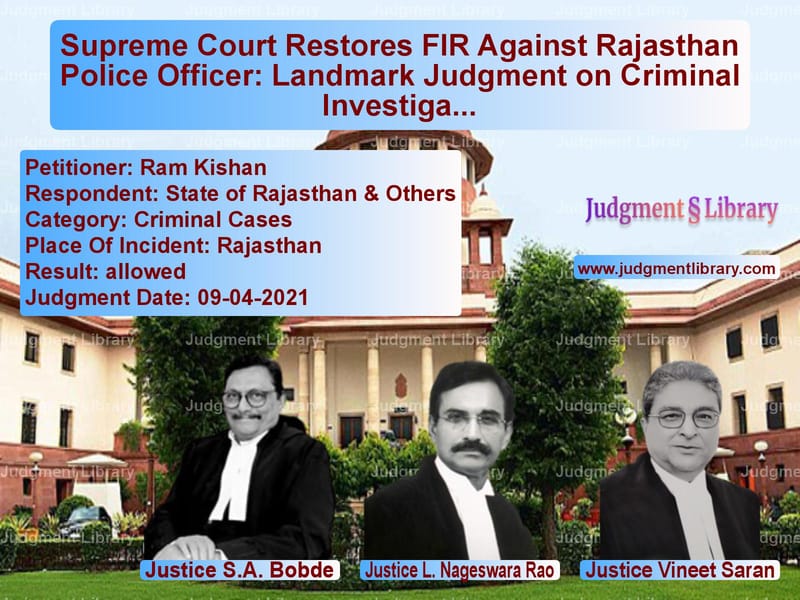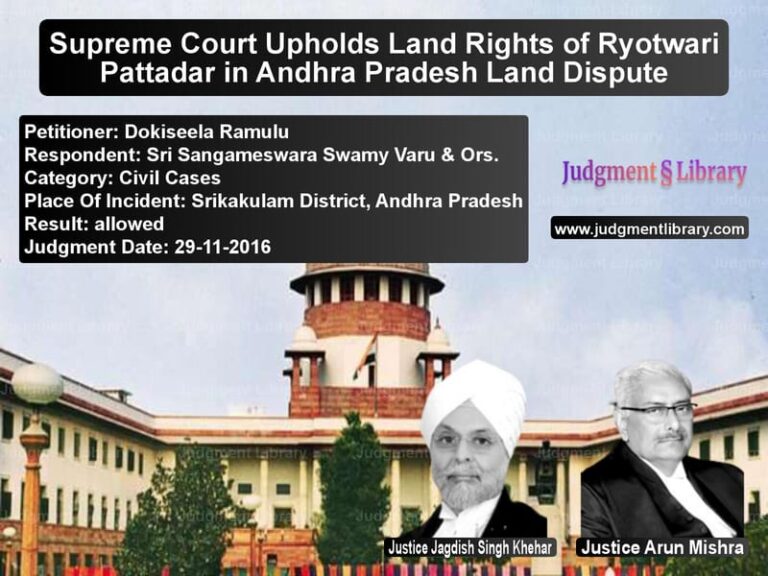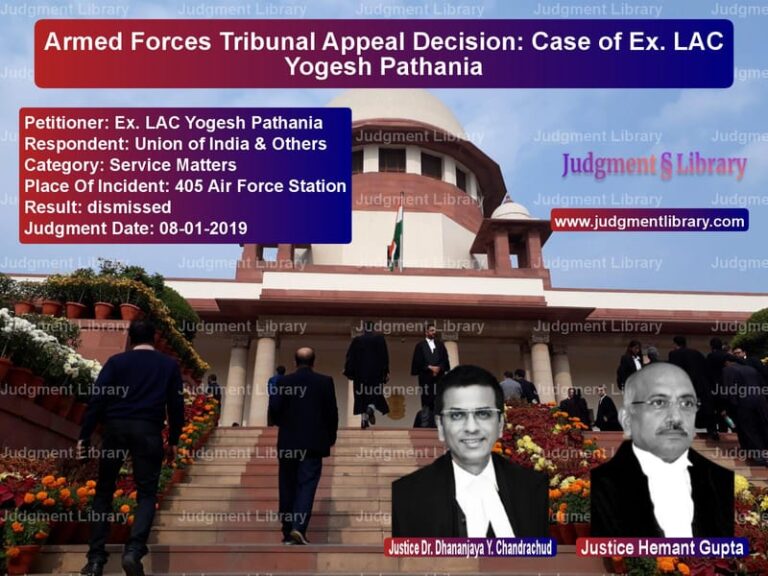Supreme Court Restores FIR Against Rajasthan Police Officer: Landmark Judgment on Criminal Investigations
The Supreme Court of India, in the case of Ram Kishan v. State of Rajasthan & Others, reinstated an FIR against a police officer accused of abusing her power and assaulting a fellow constable. This judgment highlights the principles of fair investigation and judicial restraint when interfering in criminal cases.
Background of the Case
The case revolved around an altercation between the appellant, Ram Kishan, a police constable, and the respondent, Ratna Gupta, an Inspector in Rajasthan Police. On July 21, 2006, Ram Kishan, along with a Sub-Inspector and another constable, was conducting routine vehicle checks when they stopped a motorcycle ridden by Deepak Gupta. Upon being asked for vehicle papers, Deepak Gupta allegedly fled and returned 20 minutes later with two women, one of whom was Inspector Ratna Gupta.
Read also: https://judgmentlibrary.com/mukhtar-ansaris-custody-supreme-court-orders-transfer-to-uttar-pradesh/
According to the FIR lodged by Ram Kishan (FIR No. 217 of 2006), Ratna Gupta verbally abused him using caste-based slurs, physically assaulted him, and fled the scene. However, a counter FIR (No. 218 of 2006) was filed the next day by Deepak Gupta, alleging that Ram Kishan had demanded a bribe of Rs. 100, misbehaved with the female passenger Usha Gupta, and tore her clothes.
The Rajasthan High Court later quashed FIR No. 217 of 2006, ruling that it was a retaliatory action against FIR No. 218 of 2006. Aggrieved by this, Ram Kishan appealed to the Supreme Court.
Key Issues Raised
- Whether the Rajasthan High Court was justified in quashing the FIR solely based on its assumption of retaliation.
- Whether courts can interfere in the investigation of criminal cases at the FIR stage.
- Whether the High Court failed to consider medical evidence supporting the appellant’s claims.
Arguments by the Appellant (Ram Kishan)
- “The High Court wrongly assumed that FIR No. 217 of 2006 was filed as a counterblast without considering the sequence of events.”
- “My medical report confirmed injuries sustained during the altercation, which the High Court ignored.”
- “An FIR cannot be quashed merely because a counter FIR exists. The matter should have been investigated fairly.”
Arguments by the Respondent (Ratna Gupta & State of Rajasthan)
- “FIR No. 217 of 2006 was filed only after FIR No. 218 of 2006 was registered, indicating retaliatory intent.”
- “The allegations against the respondent are exaggerated and unsubstantiated.”
- “The High Court rightly exercised its jurisdiction under Section 482 CrPC to prevent abuse of process.”
Supreme Court’s Observations and Ruling
The Supreme Court made the following key observations:
1. High Court’s Premature Interference
- “It is not for the High Court to substitute its opinion at the investigation stage. The police should be allowed to complete their probe.”
- “The mere existence of a counter FIR does not automatically invalidate the original complaint.”
2. Role of Medical Evidence
- “The High Court failed to consider the injury report of Ram Kishan, which corroborated his allegations of assault.”
- “Medical reports are crucial in criminal cases and must be evaluated before quashing an FIR.”
3. Need for Fair Investigation
- “Both FIRs should have been investigated independently instead of assuming one to be retaliatory.”
- “Quashing an FIR at the pre-investigation stage must be done sparingly and with due diligence.”
Supreme Court’s Judgment
The Supreme Court ruled in favor of Ram Kishan and restored FIR No. 217 of 2006. The Court directed the police to:
- Reopen the investigation and submit a final report under Section 173 CrPC.
- Consider all available evidence, including medical reports.
- Ensure that the investigation is completed expeditiously within a reasonable time frame.
Key Takeaways from the Judgment
- Courts should not preempt investigations: The Supreme Court reiterated that the police must be allowed to conduct a full inquiry before judicial intervention.
- Counter FIRs need independent assessment: The existence of a second FIR does not automatically nullify the first.
- Medical evidence holds significance: Injury reports and other medical documents must be given due weight.
- Judicial restraint is necessary: High Courts should exercise caution in quashing FIRs at the initial stage.
Conclusion
The Supreme Court’s ruling in Ram Kishan v. State of Rajasthan is a landmark judgment reinforcing the principle that criminal investigations must be conducted fairly and without undue judicial interference. The Court emphasized the need for careful evaluation of evidence before quashing an FIR and underscored the importance of allowing law enforcement agencies to complete their investigations.
Petitioner Name: Ram Kishan.Respondent Name: State of Rajasthan & Others.Judgment By: Justice S.A. Bobde, Justice L. Nageswara Rao, Justice Vineet Saran.Place Of Incident: Rajasthan.Judgment Date: 09-04-2021.
Don’t miss out on the full details! Download the complete judgment in PDF format below and gain valuable insights instantly!
Download Judgment: ram-kishan-vs-state-of-rajasthan-&-supreme-court-of-india-judgment-dated-09-04-2021.pdf
Directly Download Judgment: Directly download this Judgment
See all petitions in Custodial Deaths and Police Misconduct
See all petitions in Fraud and Forgery
See all petitions in Judgment by S. A. Bobde
See all petitions in Judgment by L. Nageswara Rao
See all petitions in Judgment by Vineet Saran
See all petitions in allowed
See all petitions in supreme court of India judgments April 2021
See all petitions in 2021 judgments
See all posts in Criminal Cases Category
See all allowed petitions in Criminal Cases Category
See all Dismissed petitions in Criminal Cases Category
See all partially allowed petitions in Criminal Cases Category






